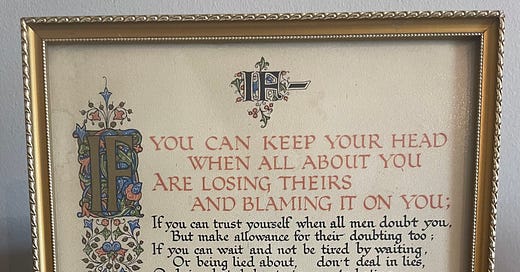Over the past few years, I’ve been exploring the world of creative writing, with a particular focus on poetry. Growing up I can’t say I ever had much interest in poems, with music, sport, and outdoor play taking priority. I do remember enjoying Rudyard Kipling’s If, a print of which hung in the hallway of my Gran and Grandad’s home, where I’d read it during family visits. I liked its artistic flair and poetic metre, though I think it was the piece’s moral message that resonated most heavily with me, even if at that age I couldn’t grasp the full extent of its profundity.
Still, in secondary school I flunked English on numerous occasions, such was my disinterest in the subject. In fact, I think if my English teacher was to discover that I now earn a small portion of my monthly income from writing (albeit in a non-creative capacity), she’d have laughed you out the room.
Then life happens. I was confronted, as we all are sooner or later, with the realities of existence. Loss and grief come out from hiding and creep ever more into the foreground. Relationships form and dissolve. Love, except for those rare, beautiful moments, is one-sided. You feel adrift, untethered, lost at sea. This presents a problem, especially for the non-believers among us: there’s no spiritual scaffolding for support. No church groups, no sermons, no religious texts to help navigate life’s difficulties. But poetry, I’ve found, helps in satisfying these existential needs and in making sense of complex human emotions.
I think it was Carol Anne Duffy’s Rapture that first piqued my interest, a collection of poetry that follows the narrator through a romantic relationship from the initial feelings of euphoria through to heartbreak and loss. I also took solace in David Whyte’s Consolations, a wonderful book that sits somewhere between poetry and philosophy, which I revisit periodically.
Of course, this isn’t to reduce poetry to a mere tool for conveying old truths or quasi-religious teachings to a modern, atheistic audience. Far from it. Poetry, both in reading and writing, is also about beauty, allowing for deeply pleasurable aesthetic experiences within the theatre of the imagination, where you’re temporarily freed, undone from your earthly shackles and transported to a new reality.
When it comes to writing poetry, I’ve been spurred on by fantastic writers on here like Joseph Fasano and his inspiring poetry prompts. And while I don’t by any means consider myself a poet, I’ve slowly but surely delved further into this world and with greater regularity. So with that, let’s pivot to this post’s poem: Metronome.
It’s a short piece inspired by those old-school wind-up metronomes. Before digital metronomes became so ubiquitous, I’d often practice my guitar for hours at a time with an older mechanical version. It struck me that during these practice sessions, throughout all of the natural ups and downs that occur when rehearsing, the metronome was always there keeping me right, patiently guiding and accompanying me via the reliable swing of its pendulum. That observation was the genesis of the poem.
Going forward, I’m hoping this newly created blog won’t simply be a mechanism for disseminating my creative efforts but will also nudge me towards writing more consistently, with this poem being the starting point. And remember: if, like me, you ever require a good dose of spiritual nourishment, look no further than poetry.






This was such a joy to read, Sandy.
Love your poem, and I'm excited to read more of your poetry!!
(I'm also a David Whyte fan)
I commented on the Google doc for this draft, but it really was mostly positive feedback which I can now share here! Love learning about your journey with poetry and what it did for your soul. And the poem was lovely as well!